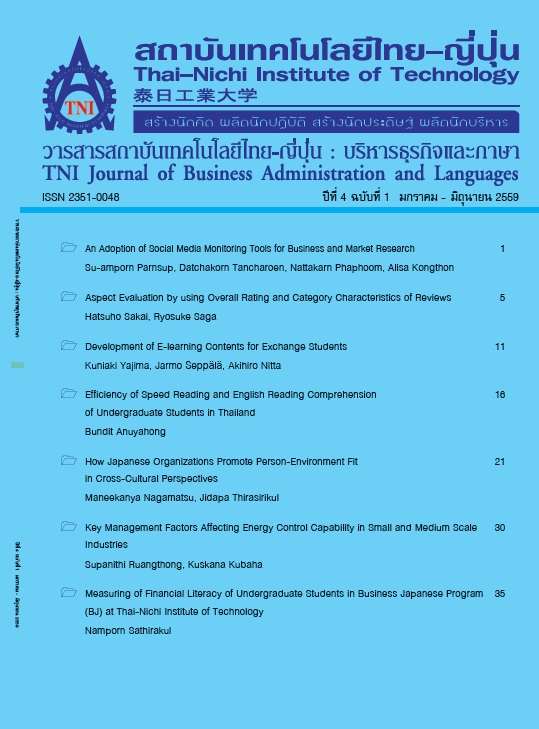Aspect Evaluation by using Overall Rating and Category Characteristics of Reviews
Main Article Content
Abstract
This paper presents a method for estimating aspect rating in reviews. Aspects are evaluated using evaluative words. The overall rating of reviews is used to estimate the rating of aspects. We assume that reviews with words expressing high evaluation possess high overall rating. We estimate evaluative words for each category because some of these words express different meanings in different categories. We determine the score of an aspect from the rating of evaluative words. The approach is validated by estimating the values of aspects by using reviews collected from kakau.com and comparing them with the original aspect ratings. Results indicate that the proposed approach can estimate aspect rating in certain cases.
Article Details
Article Accepting Policy
The editorial board of Thai-Nichi Institute of Technology is pleased to receive articles from lecturers and experts in the fields of business administration, languages, engineering and technology written in Thai or English. The academic work submitted for publication must not be published in any other publication before and must not be under consideration of other journal submissions. Therefore, those interested in participating in the dissemination of work and knowledge can submit their article to the editorial board for further submission to the screening committee to consider publishing in the journal. The articles that can be published include solely research articles. Interested persons can prepare their articles by reviewing recommendations for article authors.
Copyright infringement is solely the responsibility of the author(s) of the article. Articles that have been published must be screened and reviewed for quality from qualified experts approved by the editorial board.
The text that appears within each article published in this research journal is a personal opinion of each author, nothing related to Thai-Nichi Institute of Technology, and other faculty members in the institution in any way. Responsibilities and accuracy for the content of each article are owned by each author. If there is any mistake, each author will be responsible for his/her own article(s).
The editorial board reserves the right not to bring any content, views or comments of articles in the Journal of Thai-Nichi Institute of Technology to publish before receiving permission from the authorized author(s) in writing. The published work is the copyright of the Journal of Thai-Nichi Institute of Technology.
References
D. T. Peter and National Research Council of Canada, Ottawa, Ontario, Canada, “Thumbs up or thumbs down?: semantic orientation applied to unsupervised classification of reviews,” in Proceedings of the 40th Annual Meeting on Association for Computational Linguistics, Philadelphia, Pennsylvania, 2002, pp. 417-424.
T. Maite, B. Julian, T. Milan, V. Kimberly, and S. Manfred, “Lexicon-based methods for sentiment analysis,” MIT Press Cambridge, vol. 37, no. 2, pp. 267–307, 2011.
Y. Hong and H. Vasileios, “Towards answering opinion questions: separating facts from opinions and identifying the polarity of opinion sentences,” in Proceedings of the 2003 Conference on Empirical Methods in Natural Language Processing, 2003, pp. 129-136.
S. M. Kim and E. Hovy, “Analyzing Predictive Opinions on the Web,” in Proceedings of the 2007 Joint Conference on Empirical Methods in Natural Language Processing and Computational Natural Language Learning (EMNLP-CoNLL), Prague, Czech Republic, 2007, pp. 1056 - 1064.
K. Nozomi, M. Yuji, T. Kenji, and F. Toshikazu, “Collecting Evaluative Expressions for Opinion Extraction,” in Proceedings of the First International Joint Conference on Natural Language Processing, Hainan Island, China, 2005, pp. 596 - 605.
M.Arjun and L. Bing,“AspectExtraction ThroughSemi-supervised Modeling,” in Proceedings of the 50th Annual Meeting of the Association for Computational Linguistics: Long Papers - Volume 1, Jeju Island, Korea, 2012, pp. 339 - 348.
W. Tao, C. Yi, L. Ho fung, Y. K. L. Raymond, L. Qing, and M. Huaqing, “Product aspect extraction supervised with online domain knowledge,” Knowledge-Based Systems, vol. 71, pp. 86-100, 2014.
B. Samuel and E. Noemie, “An Unsupervised Aspect-sentiment Model for Online Reviews,” in Human Language Technologies: The 2010 Annual Conference of the North American Chapter of the Association for Computational Linguistics, Los Angeles, California, 2010, pp. 804 - 812.
F. Xianghua, L. Guo, G. Yanyan, and W. Zhiqiang, “Multi-aspect Sentiment Analysis for Chinese Online Social Reviews Based on Topic Modeling and HowNet Lexicon,” Elsevier Science Publishers B. V, vol. 37, pp. 186 - 195, 2013.
W. Hongning, L. Yue, and Z. Chengxiang, “Latent Aspect Rating Analysis on Review Text Data: A Rating Regression Approach,” in Proceedings of the 16th ACM SIGKDD International Conference on Knowledge Discovery and Data Mining, Washington, DC, USA, 2010, pp. 783 - 792.
Y. Jianxing, Z. Zheng Jun, W. Meng, and C. Tat Seng, “Aspect Ranking: Identifying Important Product Aspects from Online Consumer Reviews,” in Proceedings of the 49th Annual Meeting of the Association for Computational Linguistics: Human Language Technologies - Volume 1, Portland, Oregon, 2011, pp. 1496 - 1505.
K. Taku and M. Yuji, “Japanese Dependency Structure Analysis Based on Support Vector Machines,” in Proceedings of the 2000 Joint SIGDAT Conference on Empirical Methods in Natural Language Processing and Very Large Corpora: Held in Conjunction with the 38th Annual Meeting of the Association for Computational Linguistics - Volume 13, Hong Kong, 2000, pp. 18 - 25.
“Kakaku.” [Online]. Available:https://kakaku.com.
MeCab, “Yet Another Part-of-Speech and Morphological.” [Online]. Available:https://mecab.googlecode.com/svn/trunk/mecab/doc/index. html.
CaboCha, “Yet Another Japanese Dependency Structure Analyzer.” [Online]. Available:https://taku910.github.io/cabocha


